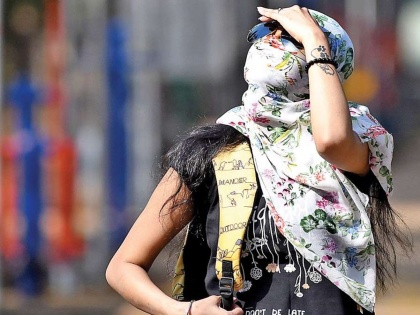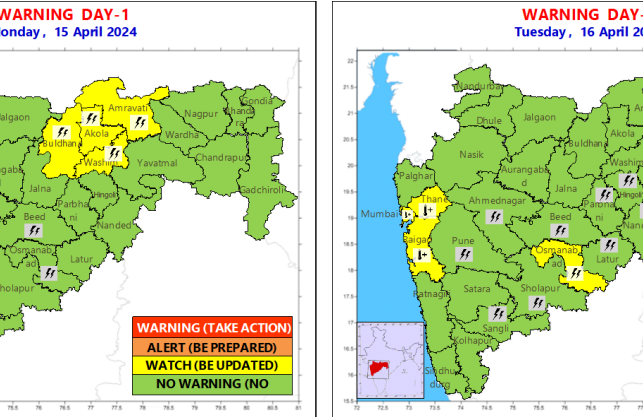Maharashtra: Heatwave Warning Issued by IMD for Mumbai, Thane and Raigad on April 16 and 17
By Lokmat English Desk | Published: April 15, 2024 02:14 PM2024-04-15T14:14:02+5:302024-04-15T14:14:21+5:30
Mumbai Regional Meteorological Centre issued severe heat wave warnings for Mumbai, Thane, and Raigad on April 15 and 16. ...

Maharashtra: Heatwave Warning Issued by IMD for Mumbai, Thane and Raigad on April 16 and 17
Mumbai Regional Meteorological Centre issued severe heat wave warnings for Mumbai, Thane, and Raigad on April 15 and 16. In a five-day forecast, the IMD said that severe heatwave conditions were very likely in some parts of Maharashtra on April 15-16.
On April 16, a yellow alert indicated that heatwave conditions in isolated pockets were very likely. Conditions are likely to ease by April 17, 2024.
According to IMD, heatwave warnings are issued when the temperature of any coastal station reaches 37 degrees celsius and the departure from normal is between 4.5 to 6.4 degrees.
Also Read | Pune Weather Forecast: Maximum Temperature to Reach 42 Degrees Celsius in Coming Week.
When both these conditions are met for a coastal station like Mumbai and when they persist for two days at more than one station, a heat wave is declared for that region. If departures exceed 6.5, the weather department issues severe heatwave conditions.
Heatwave Warning in Maharashtra
IMD advises taking necessary precautions for vulnerable people. It is advised to take precautionary measures in hot weather when going outside during peak hours of the day.
Action Suggested:
Avoid prolonged heat exposure.
Stay hydrated. Drink sufficient water even if not feeling thirsty to avoid dehydration.
Wear light weight, light colored, loose, cotton clothes.
Cover your head: use a wet cloth, hat or umbrella while going out during peak hours.
Caution workers to avoid direct sunlight during the peak hours.
Schedule strenuous jobs to cooler times of the day.
Increasing the frequency and length of rest breaks for outdoor activities.
Recognize the signs of heat stroke, heat rash or heat cramps such as weakness, dizziness, headache, nausea, sweating and seizures. If you feel faint or ill, see a doctor/ hospital immediately.
Farmers are advised to continue irrigation activities.
